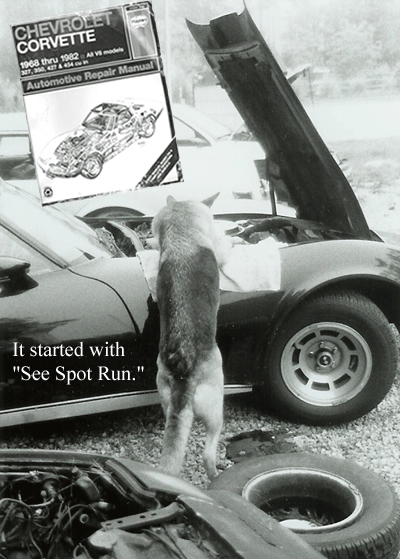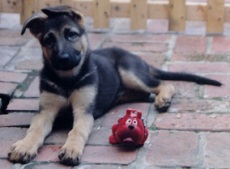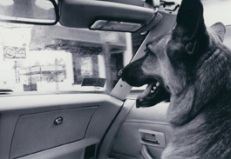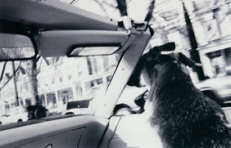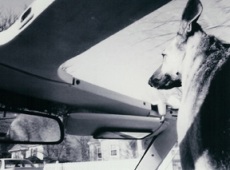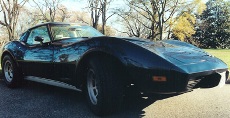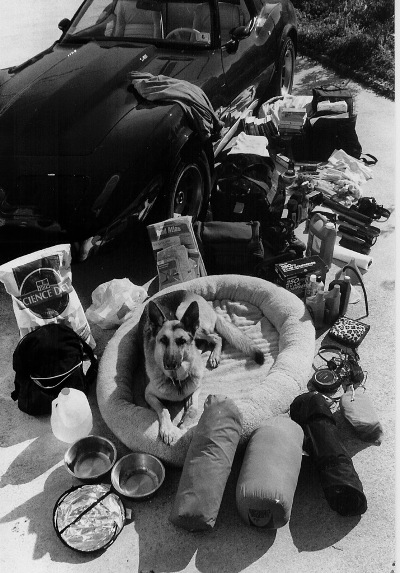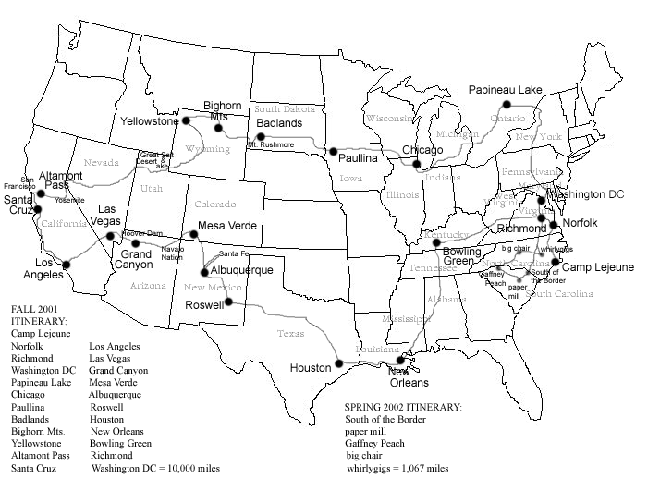READER’S GUIDE FOR “DRIVING BY MOONLIGHT”
STORY OVERVIEW
After 9/11, Kristin Henderson’s husband Frank ships out with the Marines, a Lutheran military chaplain headed for the war on terror. She’s a Quaker pacifist — he’s not. In search of peace, she hits the road with her German shepherd, Rosie, crossing America in an old Corvette.
In Driving by Moonlight, the first part of her journey takes her through her hometown of Washington, D.C., past the still-smoking Pentagon. This is the city where Kristin and Frank faced down two crises that severely tested their relationship: her crisis of religious faith, and their joint struggle to have a baby. Both Rosie and the Corvette were consolation prizes from those days when she tried to become a mother.
As the journey unfolds, Kristin explores the back roads of a changed country with Rosie, her second-choice “child”, in the car of her second-choice life. Whether she’s caught in a snowstorm high atop a mountain or facing a surgical procedure without anesthesia, she’s on a heartbreakingly funny adventure in how to give your life meaning even when you’d rather be on any road but the one you’re on.
Along the way, she worries about her husband, is startled by her own desire for revenge after 9/11, and questions her belief in nonviolence, just as she earlier questioned her belief in Christianity. That crisis of faith nearly ended a marriage already battered by her fight to have a baby Frank didn’t want.
Now, years later, Kristin peers back at her determination to pursue infertility treatment despite the expense, the pain, the lonely absurdity, and the surprisingly dangerous drugs, not to mention the toll it took on both their souls. As she tries to unlock the secret of why she was so driven to keep trying, even to the point of risking her own life to create another, she finds herself wondering: Is the primal urge to make war as unstoppable as the urge to make a baby?
Kristin hopes to arrive at an answer. Instead, she finds peace, but not without the help of her dog, her car, and the friends, family, and strangers she meets along the way — in Chicago, the single mother of an adopted child, Quaker farmers in Iowa, a gum-chewing palm reader in New Orleans, a burly cook with a literary bent on a Wyoming mountaintop, Texan poets, and more.
As Frank climbs aboard a helicopter with his Marines, on his way into Afghanistan, Kristin comes to fully appreciate her dog and her car and the life they represent, and learns the freedom that comes with letting go.
DISCUSSION QUESTIONS
1.
Kristin’s cross-country road trip is a trip she’s been dreaming of taking since she was a teenager. Do you have a dream trip? If you could take off by yourself, where would you go? Is your dream trip a fantasy or could you actually make it happen?
2.
The extraordinary measures Kristin undergoes to get pregnant force her to ask herself why she wants children so badly. Have you thought about why you do or do not want children? How far would you go to have a biological child? Do you think your answer might be different at different times in your life?
3.
Like Kristin and Frank, many infertile couples are confronted with insensitive questions and comments. When an infertile couple is at their lowest point, even a simple, “Do you have children?” can be a painfully loaded question. What would you say if you found out someone was trying and failing to have a baby? If you were infertile, what would you want someone to say to you?
4.
Kristin feels guilty for spending money on expensive infertility treatment when there are so many children in need of adoptive families. If you were or are infertile, what choice would you make and why? Do you think it’s acceptable to spend money trying to have a biological child when there are so many children without families? What is the difference, if any, between adopting and giving birth to a child?
5.
At one point Kristin says, “It’s bad karma to judge other people’s dreams.” What do you think she meant by that? Which hopes and dreams are worthy of respect and which are not? What do you dream or hope for?
6.
Driving by Moonlight is as much about Kristin’s inner, spiritual journey as it is about her outer, cross-country journey. Describe your spiritual journey. When you were a child, what was your concept of God (or whatever term you use to describe a higher power)? Do you see God differently now? Have you ever questioned the religion (or lack of religion) that you learned from your parents? If so, what happened when you questioned it?
7.
Kristin left the Lutheran Church to become a Quaker. Do you agree or disagree with the Quaker testimony that there is “That of God” in everyone? Do even terrorists have something of God in them? How does it compare with your own beliefs? Do you agree or disagree with the Quaker testimony that humanity is perfectible and can be improved?
8.
Frank felt betrayed when Kristin admitted she no longer shared his faith in Jesus as a divine savior. To Frank, it was as painful as if she’d admitted to having an affair. Why do you think it mattered so much to him? Is there anything that matters that much to you? What would it take for you to feel betrayed enough to consider ending a relationship with someone? How did Frank resolve his feelings of betrayal? Put yourself in his place — what, if anything, would you have done differently?
9.
After 9/11, Kristin struggles with being a pacifist when what she really wants is violent revenge. Nonviolent tactics were successfully used by Gandhi to liberate India from Britain, and by Martin Luther King Jr. to fight racist laws in America. Do you think those nonviolent tactics could be used to resolve the world’s conflicts today? Why or why not? What kind of nonviolent tactics do you use to resolve conflicts in your own life? Could any of those tactics be applied to the larger world?
10.
Towards the end of her trip, Kristin wonders if the primal urge to make war is any more stoppable than the urge to make a baby. What would have to change in our world for wars to be prevented? How does your life contribute to or reduce the causes of war?
11.
During their years of infertility treatment, Kristin and Frank were often in conflict. What motivated Kristin to push so hard to have a baby? What motivated Frank to resist? As you read the book, whose side were you on, or could you see both sides? In the end, Kristin essentially browbeat Frank into going along. If you were in their shoes, how would you have resolved the conflict?
12.
Kristin claims to be a pacifist, yet she drives a car with very poor gas mileage, which increases America’s need to fight for oil. Do you think she should try to change such hypocritical behavior, or are such contradictions just part of being human? What contradictions do you have in your life?
13.
Kristin describes Washington DC as “home” whether or not she actually lives there. What do you think of when you say “home”? Is it a place, a person, a feeling, or something else?
EXTRAS
The inside scoop on Rosie and the Vette,
the packing list, and the trip map.
AN UPDATE:
In 2008, five years after Driving by Moonlight was published, Rosie died peacefully at home — in Japan. That’s where Frank was assigned at the time. Over the course of her life, Rosie never stopped traveling, covering more than 100,000 miles on two continents. Frank and Kristin were lucky enough to be with her at the end as she journeyed on without them.
INSIDE ROSIE & THE VETTE
PACKING LIST
(a.k.a., THINGS YOU CAN SHOVE IN A CORVETTE)
printer and paper
external keyboard
bag of paper files for work
books, including Corvette repair manual, guidebooks for
dog motels & national parks & scenic drives, book of poetry,
several large tomes on war, 1 dozen romance novels
car cover
feather duster for dusting off car before covering
car wash detergent, wash cloths, chamois, rubber gloves
cup holders
miscellaneous tools
jack, tire iron
jumper cables
car battery charger
air compressor
duct tape, electrical tape
ice scraper
heavy-duty chain and lock for disabling
steering wheel in bad neighborhoods
compass
paper towels
bottles of motor oil, power steering fluid
2 funnels
antifreeze
Rain-X
spare fuses
windshield sun reflectors
window sun shield for dog
tire pressure gauge
small shovel
heavy duty flashlight
first aid kit
fire extinguisher
sunglasses
2 blankets, 2 sheets
umbrella
camera bag
cell phone
cell phone in-car charger
CDs
CD player
hand weights
hiking boots
jacket
duffel bag of clothes, shoes
overnight bag
purse
maps
food
gallon of water
more bottles of water
tent mat
tent
sleeping mat
sleeping bag
dog bowls
dog food
backpack of dog stuff — toys, treats
extra large dog bed
extra large dog
Another long-distance traveler carried around a whole garage in the back of his Corvette, including a spare radiator, because, well, you just never know when you might need a spare radiator.
TRIP MAP
Back to DRIVING BY MOONLIGHT page





